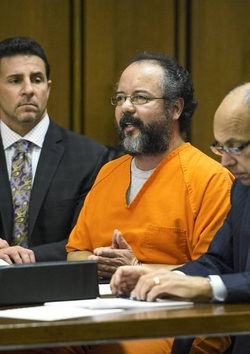
Sort of like taking a hair from the dog that bit you before it bites you, to keep it from biting you. Kind of like smoking weed to keep you from experimenting with the hard stuff.
This stunning sophistry, of course, was hailed by such similar-minded moderns as popular children's author Melvin Burgess. He said no limits should be placed on exploring anything in teenage fiction. Which, I suppose, could lead to an entirely new lit genre — teenage erotica.
Which, in turn, could lead to the head-shaking behavior of the likes of San Diego Mayor Bob Filner and serial sexster Anthony Weiner, a New York mayoral candidate.
Just how bizarre it all has become was brought home, at least to me, when Ariel Castro explained to a judge why he kidnapped and tortured three women for 10 years in a Cleveland home: Pornography made me do it. "I am not a monster," he asserted. "I'm a normal person. I'm sick."
By implication, Filner copped a similar plea when he checked himself into a sex addiction clinic for "intensive therapy." Weiner's seeming inability to control himself when he and his "junk" are within range of a smartphone also suggests an addiction.
This can open up an endless discussion about the culpability of someone whose mental illness hijacks his (normal) self and leads him into committing a crime; that's a topic for another time. Instead, I'm pointing here to the individual and social costs of an addiction that has grown so dramatically since the Internet has made it so widely available and affordable. Especially among young people.
Is it possible Castro is right when he blames pornography for his atrocities and, by implication, those of other degenerates? Have we left it up to Castro to argue that pornography is not victimless?
Especially worrisome is the appeal to the young. A 2008 study headed by Jason S. Carroll ("Pornography Acceptance and Use Among Emerging Adults") discovered that about two-thirds of young men surveyed and one-half of young women approved of pornography use. Almost 9 of 10 men and 31 percent of women interviewed reporting "using" pornography.
By any measure, that's a plague, but one you don't dare discuss without being scolded for being hopelessly antediluvian.
Yet, the Carroll study is among the many that underscore the individual and social costs of pornography. As the study said: "Results also revealed associations between pornography acceptance and use and emerging adults' risky sexual attitudes and behaviors, substance use patterns and nonmarital cohabitation values."
Mary Anne Layden, a psychotherapist and director of the Sexual Trauma and Psychopathology Program at the University of Pennsylvania, concludes that pornography addiction can become so serious that it sometimes causes the loss of a marriage, family and jobs.
Dr. Norman Doidge, of Columbia University's Center for Psychoanalytic Training, said pornography, "by offering an endless harem of sexual objects, hyper-activates the appetitive system. Porn viewers develop new maps in their brains, based on the photos and videos they see. Because it is a use-it-or-lose-it brain, when we develop a map area, we long to keep it activated. Just as our muscles become impatient for exercise if we've been sitting all day, so too do our senses hunger to be stimulated."
This post was written by Dennis Byrne of the Chicago Tribune. You can find the original post here: http://articles.chicagotribune.com/2013-08-13/opinion/ct-oped-0813-byrne-20130813_1_ariel-castro-addiction-teenage-fiction
BE HOLY.
BE A MAN.
 RSS Feed
RSS Feed